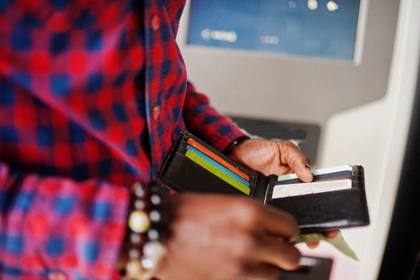How spending on a credit card works
When you spend with a credit card, the provider pays the retailer upfront. You then owe that amount to the card provider, not the shop.
Each month, you’ll get a statement showing:
- How much you’ve spent
- Any interest or fees
- Your minimum payment
- The payment due date
You’ll need to make at least the minimum payment by the due date. But if you only pay the minimum, you’ll be charged interest on the remaining balance – which can add up quickly.
What is a credit limit on a credit card?
A credit limit is the maximum amount you're allowed to borrow on your credit card. It’s set by your provider when you apply for the card and is based on factors like:
- Your credit history
- Your income
- Your existing debts
- How well you’ve managed credit in the past
If you're new to credit or have a low credit score, your limit may start off quite low. Over time, your provider might offer to increase it – or you can ask for a change yourself.
Staying within your limit is key. Going over it could lead to:
- Fees
- A declined transaction
- A negative mark on your credit report
💡 Tip: You don’t have to use your full limit. Spending less and paying it off regularly can help show lenders you’re in control.
Ocean Credit Card
See if it's a YES before you apply
- Up to £1,500 credit limit
- Checking won't affect your credit score
- Get a response in 60 seconds
39.9% APR
Representative (variable)
Intelligent Lending Ltd (credit broker). Capital One is the exclusive lender.

How does credit card interest work?
Interest is what you’re charged for borrowing money on a credit card – unless you repay your full balance within the interest-free period. It’s usually shown as an APR (Annual Percentage Rate).
Here’s how it works:
- If you pay your full balance each month, you won’t pay interest on purchases (unless it’s a cash withdrawal or a fee-based transaction).
- If you only pay the minimum, you’ll be charged interest on the remaining balance.
- That interest gets added to your balance and can grow quickly if not managed.
💡 Tip: As well as interest, you could also be charged extra fees for certain actions, including:
- Cash withdrawals – usually attract interest straight away, without an interest-free period
- Late or missed payments – can trigger fees and damage your credit score
- Going over your credit limit – might result in an over-limit fee
Some cards offer 0% interest for a limited time, often on:
- New purchases
- Balance transfers
- Money transfers
Once the 0% period ends, standard interest rates kick in – so it's important to know when your deal expires.
💡 Tip: To reduce interest charges, try to pay more than the minimum or clear your balance in full when you can.
Types of credit cards
There are several types of credit cards to suit different needs. These include:
- 0% purchase cards – offer interest-free spending for a set time
- Balance transfer cards – let you move existing debt to a new card, often with 0% interest
- Credit builder cards – aimed at people with poor or limited credit history
- Rewards or cashback cards – give you perks for spending
- Money transfer cards – let you move money from your card into your bank account
Choosing the right card depends on how you plan to use it – for example, whether you want to spread the cost of a large item or improve your credit score.
❗Just keep in mind: Rewards cards tend to have higher interest rates, so they only work in your favour if you repay in full each month.
Pros and cons of using a credit card
Advantages:
- Build or improve your credit score (if used responsibly)
- Protection on purchases over £100 and up to £30,000 under Section 75 of the Consumer Credit Act
- Can help manage cash flow or cover emergencies
- Some offer perks like cashback or travel insurance
Disadvantages:
- Easy to overspend or rely too heavily on borrowing
- High interest if you don’t pay off the full balance
- Missed or late payments can hurt your credit score, trigger fees, or even lead to a reduced credit limit.
How to apply for a credit card
When you apply for a credit card, the lender will check your credit file to assess your application. This helps them decide whether to offer you a card and what your credit limit and interest rate will be.
You’ll usually need to:
- Be over 18
- Be a UK resident
- Have a regular income
Some providers offer a soft search eligibility checker, which shows your chances of being accepted without having an effect on your credit history – helping you apply with more confidence.
It’s a good idea to compare cards and apply for one that matches your credit profile – too many applications in a short space of time can damage your credit record.
Tips for using your credit card wisely
To stay on top of your credit card:
- Set up a Direct Debit to avoid missing payments
- Pay more than the minimum whenever you can
- Don’t exceed your credit limit
- Keep track of your spending and interest
If you’re using a 0% card, make a note of when the deal ends so you’re not caught out by higher interest later.
Try to clear the balance in full each month if possible – this helps avoid interest and shows lenders you can manage credit well.
Understanding how credit cards work
A credit card gives you flexible access to borrowing – you spend up to your credit limit, repay what you owe, and can borrow again.
Used well, it can help build your credit score, spread the cost of purchases, and provide a financial safety net. But if mismanaged, it can lead to debt and harm your credit rating.
To get the most out of your credit card:
- Understand how interest works
- Pick the right type of card for your needs
- Always make at least the minimum repayment on time
Treat it as a tool – not free money – and it can work to your advantage.
Disclaimer: We make every effort to ensure content is correct when published. Information on this website doesn't constitute financial advice, and we aren't responsible for the content of any external sites.






